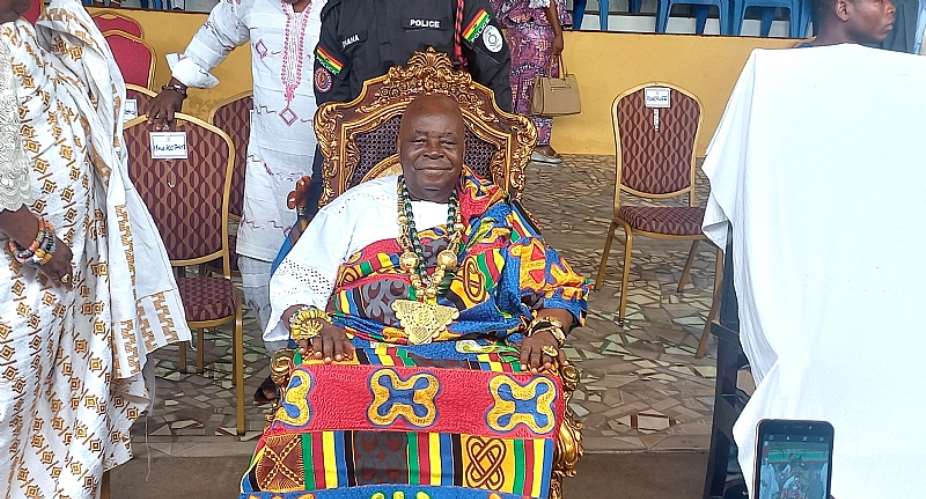Introduction:
Cultural heritage, in the form of traditional festivals, holds immense potential for local community development. The Hogbetsotso Festival, celebrated annually by the Anlo-Ewe people in Southern Ghana, serves as a prime example of how cultural traditions can be harnessed to drive socio-economic progress in the local setting. This article explores the multifaceted dimensions of the Hogbetsotso Festival and its impact on the local community.
Socio-economic Importance of the Hogbetsotso Festival.
The Hogbetsotso Festival is deeply ingrained in the Anlo-Ewe culture, and its significance transcends mere cultural celebration. This festival acts as a catalyst for socio-economic development in several ways:
a. Cultural Preservation: Hogbetsotso serves as a platform for preserving the rich cultural heritage of the Anlo-Ewe people. Through traditional dances, music, enactment and storytelling, the younger generation is exposed to their roots and history, fostering a sense of belonging and identity.
b. Economic Opportunities: The festival creates employment opportunities for locals in various sectors, including hospitality, crafts, and food services. Local artisans, for example, benefit from increased sales of traditional artifacts, and other paraphernalia, which bolsters the local economy.
c. Infrastructure Development: The influx of tourists during the festival season often leads to improvements in local infrastructure, such as roads, sanitation facilities, and public spaces. These upgrades have long-term benefits for the community.

Promotion of Tourism at the Local Level:
The Hogbetsotso Festival is a magnet for tourists, both domestic and international, seeking an authentic cultural experience. Its unique blend of history, spirituality, and vibrant celebrations make it a must-visit destination. Local tourism is elevated through:
a. Cultural Exchange: The festival encourages cultural exchange between the Anlo-Ewe people and tourists, fostering mutual understanding and appreciation of diverse traditions.
b. Income Generation: Local communities benefit from increased tourism revenue, as tourists spend on accommodation, food, souvenirs, and cultural experiences. This revenue contributes to improved living standards and community investments.
Attraction of Both Local and Foreign Tourists:
The Hogbetsotso Festival's appeal extends beyond national borders. Its significance has attracted a diverse range of visitors, including international tourists. This influx of tourists underscores the festival's global recognition and potential for cross-cultural exchange.
a. Educational Value: Foreign tourists gain insights into the Anlo-Ewe culture and heritage, promoting cross-cultural understanding and appreciation.
b. Economic Boost: The festival's international appeal translates into increased revenue for local businesses, ultimately driving economic growth.

Contribution to Local Community Development:
The Hogbetsotso Festival's impact on local community development is substantial:
a. Education and Skill Development: The festival provides opportunities for young people to learn traditional crafts, music, and dance, preserving these skills for future generations.
b. Healthcare and Social Services: Festival proceeds often fund community projects, including community centres, healthcare facilities and educational initiatives, improving overall quality of life.
c. Infrastructure Enhancement: Local authorities prioritize infrastructure development to accommodate festival-goers, leaving a lasting legacy of improved facilities for residents.
The Imperative of Cultural Heritage Preservation:
Preserving the Hogbetsotso Festival and similar cultural traditions is essential for future generations. Without proactive efforts to protect these heritage celebrations, communities risk losing their unique identities and the socio-economic benefits that accompany them.
a. Documentation and Archiving: Rigorous documentation of festival practices, rituals, and history is imperative to ensure that knowledge is passed down through generations.
b. Cultural Education: Integration of cultural education into formal curricula ensures that young people understand and value their cultural heritage.
c. Sustainable Tourism Practices: To protect the authenticity of the Hogbetsotso Festival, sustainable tourism practices must be adopted, preventing over-commercialization and cultural dilution.
Conclusion:
The Hogbetsotso Festival among the Anlo-Ewe people in Southern Ghana exemplifies the transformative power of cultural heritage in local community development. By preserving traditions, promoting tourism, and fostering economic growth, this festival enriches the lives of both residents and visitors. However, it is crucial to recognize the need for careful preservation to ensure that future generations can continue to reap the benefits of this invaluable cultural heritage. Embracing and safeguarding festivals like Hogbetsotso is not only a responsibility but also a strategic investment in the prosperity of local communities worldwide.
Joel Degue,
Writer, Author and Blogger.





 S.Africa building collapse kills one, traps dozens: police
S.Africa building collapse kills one, traps dozens: police
 Election 2024: I’m ready to serve Ghana with my heart, energies – Bawumia
Election 2024: I’m ready to serve Ghana with my heart, energies – Bawumia
 We saved Ghana $19million in 2020 elections – EC
We saved Ghana $19million in 2020 elections – EC
 Nobody has ever enticed me with money to rule in his or her favour — Otumfuo
Nobody has ever enticed me with money to rule in his or her favour — Otumfuo
 Limited voter registration: Dumsor will not affect registration, we've rented ge...
Limited voter registration: Dumsor will not affect registration, we've rented ge...
 Back Free SHS policy with legislative instrument to prevent successive govt from...
Back Free SHS policy with legislative instrument to prevent successive govt from...
 Dadieso LPG tanker accident: No live or property lost as speculated, product suc...
Dadieso LPG tanker accident: No live or property lost as speculated, product suc...
 EOCO to return docket on Cecilia Abena Dapaah to OSP over lack of evidence
EOCO to return docket on Cecilia Abena Dapaah to OSP over lack of evidence
 Police, youth clash at Dambai; teenager killed by stray bullet
Police, youth clash at Dambai; teenager killed by stray bullet
 Court convicts student for issuing GHC50,000 dud cheque
Court convicts student for issuing GHC50,000 dud cheque
